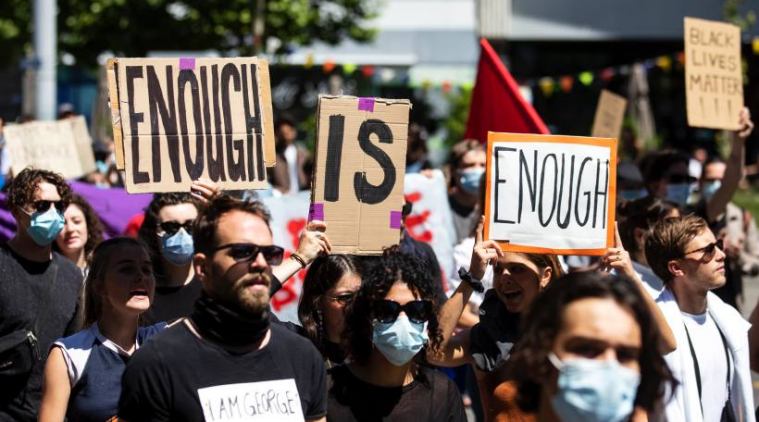Protests in the aftermath of George Floyd’s killing, mishandling of pandemic bear disturbing parallels to what has been going on in India.
The video of George Floyd, an African-American man, being killed by policemen ignited the flames of anger that brought people in large parts of America to the streets in protest, and to conflict with the authorities. The police, military and propaganda mills were let loose to quell the people’s anger. These strategies, typical of the Donald Trump administration, were looked at by people across the world with great indignation. A chain of repressive measures was bound to fail in the face of such widespread discontent among the people. The system is being questioned. The killing of George Floyd was only a trigger for the wrath in American society.
The people’s revolt engulfing the length and breadth of America should be an eye-opener to oppressive regimes the world over. It shows the world the deepening crisis of Trumpism, which has become the synonym for the aggressive capitalism followed by many countries, including India. Trump and his cohorts have attempted to depict the current unrest as a simple law and order issue. It is a social and political upheaval with serious economic dimensions. That racial hatred that led to Floyd’s death has its roots in the socioeconomic contradictions in American society.
Solidarity movements have sprung up in different countries, across continents. World leaders like UN Secretary-General António Guterres, Pope Francis and Canadian Prime Minister Justin Trudeau have come out openly in support of human rights.
The outbreak of COVID-19 unmasked the inability of the American system to protect human lives. The world’s biggest military power could not even provide masks for its citizens. Its economy is in bad shape — growth rates have tumbled. The latest ILO report says that the US would be the worst hit in the post-COVID period at a time when global joblessness is estimated to be at 305 million. Unemployment in the citadel of neoliberal growth has reached 23.9 per cent. About 17 per cent of the population has been rendered homeless.
It would be a mistake to understand the revolt as only a reaction of Black Americans to a police killing. People of all ethnic groups, including whites, have joined the protests. AFL-CIO, the most representative trade union in the US, is actively involved in mass actions.
The ideological brethren of Trump in various parts of the world must be watching the developments in the US. In Prime Minister Narendra Modi, Trump has found a friend on the global stage. And his friend is always keen to follow the philosophy, views, strategies and the economic measures pursued by the American big brother. Hence, the global crisis of capitalism, which was worsened by the pandemic, has had an undeniable effect in India as well. Modi’s style of fighting COVID-19 is the Indian version of what Trump has done. Both believe in propaganda rather than providing protection to people. The tragic scenes of Indian migrant labourers have caught the attention of the world. The death toll in India has reached nearly 15,000. The unemployment rate touched 23.52 per cent in May, according to the data released by CMIE.
The stimulus package announced by the Modi government is nothing but hollow promises. Instead of the much-talked-about Rs 20 lakh crore, the actual amount is barely Rs 2 lakh crore. In the name of helping the poor, ultra-right governments in the US, India, Brazil and Turkey are behaving as agents of big capital. And to facilitate this track of development, they ruthlessly attack workers and their rights. In America, they ransacked the headquarters of the American Federation of Labour. In India, they are snatching away the hard-earned rights of the workers even without a parliamentary debate. And the Trump-Modi style of politics has proven its expertise in engineering the politics of hatred using communal and racial tools. Parallels could be seen between the events in America and the attacks on minorities, Dalits and Adivasis in India. In a way, this reveals the shared feelings of insecurity among the ruling classes.
The writer is the Secretary of Communist Party of India, National Council and leader of the party in Parliament
Source: Read Full Article





